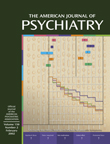Clozapine for First-Episode Schizophrenia
To the Editor: The use of clozapine to treat first episodes of psychosis has rarely been reported (1, 2). We present the case of a young man with a first episode of schizophrenia who had a sustained, complete resolution of symptoms with clozapine treatment.
Mr. A was a 30-year-old man who came to the emergency room after attempting suicide by overdose. In the preceding 6 months, he had noticed feelings of being watched and feared a Mafia plot against him. He had delusions of reference about the television and thought that strangers knew his history. He claimed to have telepathy, thought that energy was passing between people, and heard voices telling him to kill himself. The emergency room physician proposed a diagnosis of paranoid schizophrenia, which was confirmed when measured against DSM-IV criteria upon his first hospital admission by a physician experienced in schizophrenia research.
Six months earlier, Mr. A had been treated for depressive symptoms by a general practitioner, who prescribed an 8-week trial of paroxetine. Mr. A’s family history had revealed alcoholism, depression, bipolar affective disorder, and suicide by an uncle. Mr. A reported drinking two to three beers per week and occasionally using cannabis.
When Mr. A was admitted for treatment of his first episode of psychosis, he initially had a short (2-week) trial of olanzapine. While he was still experiencing his first episode of psychotic illness, he consented to participate in the International Suicide Prevention Trial (InterSePT) and was given clozapine during a 4-week crossover period in which he received both antipsychotics. Clozapine, 12.5 mg/day, was gradually increased over 5 weeks to 100 mg/day and was maintained at a dose of 112.5 mg/day. Concomitant medication included only gabapentin, 2400 mg/day, for situational anxiety (3).
Mr. A’s baseline scores were rated with the Positive and Negative Syndrome Scale (4) (positive symptoms: score=19, negative symptoms: score=20, total score=90), the Clinical Global Impression (CGI) scale (score=4), the Calgary Depression Scale (5) (depression: score=15, anxiety: score=5), the InterSePT Suicidality Scale (6) (score=9), and the Extrapyramidal Symptom Rating Scale (7) (parkinsonism: score=7, dyskinesia: score=1). After 8 weeks of treatment he had improved dramatically. He maintained this improvement, and after 2 years his total score on the Positive and Negative Syndrome Scale was 30 (minimal score=30), his CGI scale score was 1, his scores on the Calgary Depression Scale were 0 for both depression and anxiety, his InterSePT Suicidality Scale score was 0, and his score on the Extrapyramidal Symptom Rating Scale showed no movement disorder. After 2 years of clozapine treatment, he lives with a roommate and works full-time in the aviation industry.
Several authors have questioned whether clozapine should be indicated as a first-line treatment for early psychosis (1, 2, 8). The risk-benefit ratio has been reappraised (9) in view of the lower rates of relapse, hospitalization, extrapyramidal symptoms, and suicidality and the improvements in negative symptoms, cognition, and social functioning associated with clozapine. Long-term outcome studies of patients treated with clozapine early in the course of their illness and spared the neurotoxicity of long-term exposure to traditional antipsychotics are needed.
1. Szymanski S, Masiar S, Mayerhoff D, Loebel A, Geisler S, Pollack S, Kane J, Lieberman J: Clozapine response in treatment-refractory first-episode schizophrenia. Biol Psychiatry 1994; 35:278-280Crossref, Medline, Google Scholar
2. Hector RI: The use of clozapine in the treatment of aggressive schizophrenia. Can J Psychiatry 1998; 43:466-472Crossref, Medline, Google Scholar
3. Chouinard G, Beauclair L, Belanger MC: Gabapentin: long-term antianxiety and hypnotic effects in psychiatric patients with comorbid anxiety-related disorders (letter). Can J Psychiatry 1998; 43:305Crossref, Medline, Google Scholar
4. Kay SR, Fiszbein A, Opler LA: The Positive and Negative Syndrome Scale (PANSS) for schizophrenia. Schizophr Bull 1987; 13:261-276Crossref, Medline, Google Scholar
5. Addington D, Addington J, Maticka-Tyndale E, Joyce J: Reliability and validity of a depression rating scale for schizophrenics. Schizophr Res 1992; 6:201-208Crossref, Medline, Google Scholar
6. Lindenmayer JP, Czobor P, Alphs A, Anand R, Islam Z, Pestreich L: The InterSePT Scale for Suicidal Thinking (ISST): A new assessment instrument for suicidal patients with schizophrenia (abstract). Schizophr Res 2001; 49(suppl 1-2):5Google Scholar
7. Chouinard G, Ross-Chouinard A, Annable L, Jones B: The Extrapyramidal Symptom Rating Scale (abstract). Can J Neurol Sci 1980, 7:233Google Scholar
8. Green AI, Schildkraut JJ: Should clozapine be a first-line treatment for schizophrenia? the rationale for a double-blind clinical trial in first-episode patients. Harv Rev Psychiatry 1995; 3:1-9Crossref, Medline, Google Scholar
9. Meltzer HY, Okayli G: Reduction of suicidality during clozapine treatment of neuroleptic-resistant schizophrenia: impact on risk-benefit assessment. Am J Psychiatry 1995; 152:183-190Link, Google Scholar



